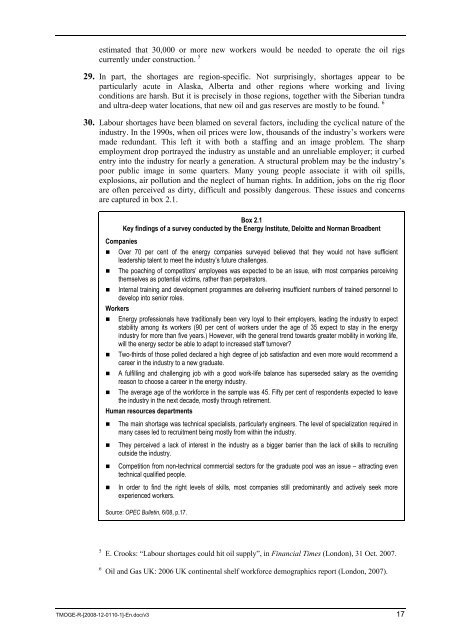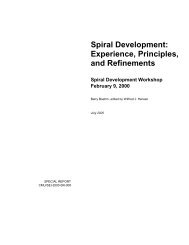wcms_161662
wcms_161662
wcms_161662
You also want an ePaper? Increase the reach of your titles
YUMPU automatically turns print PDFs into web optimized ePapers that Google loves.
estimated that 30,000 or more new workers would be needed to operate the oil rigs<br />
currently under construction. 5<br />
29. In part, the shortages are region-specific. Not surprisingly, shortages appear to be<br />
particularly acute in Alaska, Alberta and other regions where working and living<br />
conditions are harsh. But it is precisely in those regions, together with the Siberian tundra<br />
and ultra-deep water locations, that new oil and gas reserves are mostly to be found. 6<br />
30. Labour shortages have been blamed on several factors, including the cyclical nature of the<br />
industry. In the 1990s, when oil prices were low, thousands of the industry’s workers were<br />
made redundant. This left it with both a staffing and an image problem. The sharp<br />
employment drop portrayed the industry as unstable and an unreliable employer; it curbed<br />
entry into the industry for nearly a generation. A structural problem may be the industry’s<br />
poor public image in some quarters. Many young people associate it with oil spills,<br />
explosions, air pollution and the neglect of human rights. In addition, jobs on the rig floor<br />
are often perceived as dirty, difficult and possibly dangerous. These issues and concerns<br />
are captured in box 2.1.<br />
Box 2.1<br />
Key findings of a survey conducted by the Energy Institute, Deloitte and Norman Broadbent<br />
Companies<br />
Over 70 per cent of the energy companies surveyed believed that they would not have sufficient<br />
leadership talent to meet the industry’s future challenges.<br />
The poaching of competitors’ employees was expected to be an issue, with most companies perceiving<br />
themselves as potential victims, rather than perpetrators.<br />
Internal training and development programmes are delivering insufficient numbers of trained personnel to<br />
develop into senior roles.<br />
Workers<br />
Energy professionals have traditionally been very loyal to their employers, leading the industry to expect<br />
stability among its workers (90 per cent of workers under the age of 35 expect to stay in the energy<br />
industry for more than five years.) However, with the general trend towards greater mobility in working life,<br />
will the energy sector be able to adapt to increased staff turnover?<br />
Two-thirds of those polled declared a high degree of job satisfaction and even more would recommend a<br />
career in the industry to a new graduate.<br />
A fulfilling and challenging job with a good work-life balance has superseded salary as the overriding<br />
reason to choose a career in the energy industry.<br />
The average age of the workforce in the sample was 45. Fifty per cent of respondents expected to leave<br />
the industry in the next decade, mostly through retirement.<br />
Human resources departments<br />
The main shortage was technical specialists, particularly engineers. The level of specialization required in<br />
many cases led to recruitment being mostly from within the industry.<br />
They perceived a lack of interest in the industry as a bigger barrier than the lack of skills to recruiting<br />
outside the industry.<br />
Competition from non-technical commercial sectors for the graduate pool was an issue – attracting even<br />
technical qualified people.<br />
In order to find the right levels of skills, most companies still predominantly and actively seek more<br />
experienced workers.<br />
Source: OPEC Bulletin, 6/08, p.17.<br />
5 E. Crooks: “Labour shortages could hit oil supply”, in Financial Times (London), 31 Oct. 2007.<br />
6 Oil and Gas UK: 2006 UK continental shelf workforce demographics report (London, 2007).<br />
TMOGE-R-[2008-12-0110-1]-En.doc/v3 17














